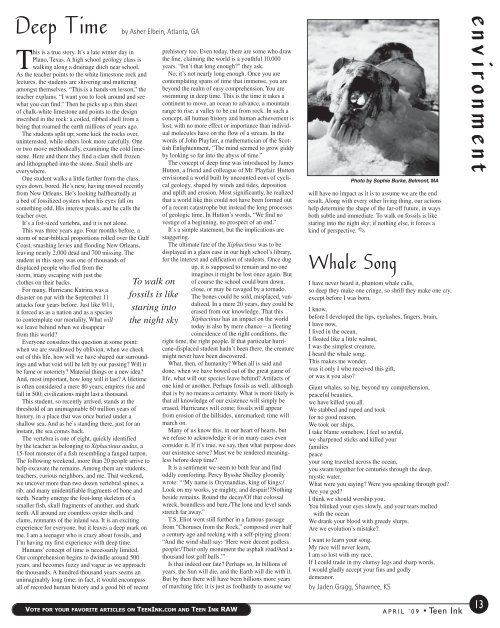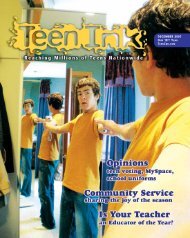Create successful ePaper yourself
Turn your PDF publications into a flip-book with our unique Google optimized e-Paper software.
Deep Time by<br />
This is a true story. It’s a late winter day in<br />
Plano, Texas. A high school geology class is<br />
walking along a drainage ditch near school.<br />
As the teacher points to the white limestone rock and<br />
lectures, the students are shivering and muttering<br />
amongst themselves. “This is a hands-on lesson,” the<br />
teacher explains. “I want you to look around and see<br />
what you can find.” Then he picks up a thin sheet<br />
of chalk-white limestone and points to the design<br />
inscribed in the rock: a coiled, ribbed shell from a<br />
being that roamed the earth millions of years ago.<br />
The students split up; some kick the rocks over,<br />
uninterested, while others look more carefully. One<br />
or two move methodically, examining the cold limestone.<br />
Here and there they find a clam shell frozen<br />
and lithographed into the stone. Snail shells are<br />
everywhere.<br />
One student walks a little farther from the class,<br />
eyes down, bored. He’s new, having moved recently<br />
from New Orleans. He’s looking halfheartedly at<br />
a bed of fossilized oysters when his eyes fall on<br />
something odd. His interest peaks, and he calls the<br />
teacher over.<br />
It’s a fist-sized vertebra, and it is not alone.<br />
This was three years ago. Four months before, a<br />
storm of near-biblical proportions rolled over the Gulf<br />
Coast, smashing levies and flooding New Orleans,<br />
leaving nearly 2,000 dead and 700 missing. The<br />
student in this story was one of thousands of<br />
displaced people who fled from the<br />
storm, many escaping with just the<br />
clothes on their backs.<br />
For many, Hurricane Katrina was a<br />
disaster on par with the September 11<br />
attacks four years before. Just like 9/11,<br />
it forced us as a nation and as a species<br />
to contemplate our mortality. What will<br />
we leave behind when we disappear<br />
from this world?<br />
Everyone considers this question at some point:<br />
when we are swallowed by oblivion, when we check<br />
out of this life, how will we have shaped our surroundings<br />
and what void will be left by our passing? Will it<br />
be fame or notoriety? Material things or a new idea?<br />
And, most important, how long will it last? A lifetime<br />
is often considered a mere 80 years; empires rise and<br />
fall in 500; civilizations might last a thousand.<br />
This student, so recently arrived, stands at the<br />
threshold of an unimaginable 60 million years of<br />
history, in a place that was once buried under a<br />
shallow sea. And as he’s standing there, just for an<br />
instant, the sea comes back.<br />
The vertebra is one of eight, quickly identified<br />
by the teacher as belonging to Xiphactinus audax, a<br />
15-foot monster of a fish resembling a fanged tarpon.<br />
The following weekend, more than 20 people arrive to<br />
help excavate the remains. Among them are students,<br />
teachers, curious neighbors, and me. That weekend,<br />
we uncover more than two dozen vertebral spines, a<br />
rib, and many unidentifiable fragments of bone and<br />
teeth. Nearby emerge the foot-long skeleton of a<br />
smaller fish, skull fragments of another, and shark<br />
teeth. All around are countless oyster shells and<br />
clams, remnants of the inland sea. It is an exciting<br />
experience for everyone, but it leaves a deep mark on<br />
me. I am a teenager who is crazy about fossils, and<br />
I’m having my first experience with deep time.<br />
Humans’ concept of time is necessarily limited.<br />
Our comprehension begins to dwindle around 500<br />
years, and becomes fuzzy and vague as we approach<br />
the thousands. A hundred thousand years seems an<br />
unimaginably long time; in fact, it would encompass<br />
all of recorded human history and a good bit of recent<br />
Asher Elbein, Atlanta, GA<br />
To walk on<br />
fossils is like<br />
staring into<br />
the night sky<br />
prehistory too. Even today, there are some who draw<br />
the line, claiming the world is a youthful 10,000<br />
years. “Isn’t that long enough?” they ask.<br />
No, it’s not nearly long enough. Once you are<br />
contemplating spans of time that immense, you are<br />
beyond the realm of easy comprehension. You are<br />
swimming in deep time. This is the time it takes a<br />
continent to move, an ocean to advance, a mountain<br />
range to rise, a valley to be cut from rock. In such a<br />
concept, all human history and human achievement is<br />
lost, with no more effect or importance than individual<br />
molecules have on the flow of a stream. In the<br />
words of John Playfair, a mathematician of the Scottish<br />
Enlightenment, “The mind seemed to grow giddy<br />
by looking so far into the abyss of time.”<br />
The concept of deep time was introduced by James<br />
Hutton, a friend and colleague of Mr. Playfair. Hutton<br />
envisioned a world built by uncounted eons of cyclical<br />
geology, shaped by winds and tides, deposition<br />
and uplift and erosion. Most significantly, he realized<br />
that a world like this could not have been formed out<br />
of a recent catastrophe but instead the long processes<br />
of geologic time. In Hutton’s words, “We find no<br />
vestige of a beginning, no prospect of an end.”<br />
It’s a simple statement, but the implications are<br />
staggering.<br />
The ultimate fate of the Xiphactinus was to be<br />
displayed in a glass case in our high school’s library,<br />
for the interest and edification of students. Once dug<br />
up, it is supposed to remain and no one<br />
imagines it might be lost once again. But<br />
of course the school could burn down,<br />
close, or may be ravaged by a tornado.<br />
The bones could be sold, misplaced, vandalized.<br />
In a mere 20 years, they could be<br />
erased from our knowledge. That this<br />
Xiphactinus has an impact on the world<br />
today is also by mere chance – a fleeting<br />
coincidence of the right conditions, the<br />
right time, the right people. If that particular hurricane-displaced<br />
student hadn’t been there, the creature<br />
might never have been discovered.<br />
What, then, of humanity? When all is said and<br />
done, when we have bowed out of the great game of<br />
life, what will our species leave behind? Artifacts of<br />
one kind or another. Perhaps fossils as well, although<br />
that is by no means a certainty. What is more likely is<br />
that all knowledge of our existence will simply be<br />
erased. Hurricanes will come; fossils will appear<br />
from erosion of the hillsides, unremarked; time will<br />
march on.<br />
Many of us know this, in our heart of hearts, but<br />
we refuse to acknowledge it or in many cases even<br />
consider it. If it’s true, we say, then what purpose does<br />
our existence serve? Must we be rendered meaningless<br />
before deep time?<br />
It is a sentiment we seem to both fear and find<br />
oddly comforting. Percy Bysshe Shelley gloomily<br />
wrote: “‘My name is Ozymandias, king of kings:/<br />
Look on my works, ye mighty, and despair!’/Nothing<br />
beside remains. Round the decay/Of that colossal<br />
wreck, boundless and bare,/The lone and level sands<br />
stretch far away.”<br />
T.S. Eliot went still further in a famous passage<br />
from “Choruses from the Rock,” composed over half<br />
a century ago and reeking with a self-pitying gloom:<br />
“And the wind shall say: ‘Here were decent godless<br />
people:/Their only monument the asphalt road/And a<br />
thousand lost golf balls.’”<br />
Is that indeed our fate? Perhaps so. In billions of<br />
years, the Sun will die, and the Earth will die with it.<br />
But by then there will have been billions more years<br />
of marching life; it is just as foolhardy to assume we<br />
VOTE FOR YOUR FAVORITE ARTICLES ON TEENINK.COM AND TEEN INK RAW<br />
Photo by Sophie Burke, Belmont, MA<br />
will have no impact as it is to assume we are the end<br />
result. Along with every other living thing, our actions<br />
help determine the shape of the far-off future, in ways<br />
both subtle and immediate. To walk on fossils is like<br />
staring into the night sky; if nothing else, it forces a<br />
kind of perspective. ✎<br />
Whale Song<br />
I have never heard it, phantom whale calls,<br />
so deep they make one cringe, so shrill they make one cry,<br />
except before I was born.<br />
I know,<br />
before I developed the lips, eyelashes, fingers, brain,<br />
I have now,<br />
I lived in the ocean,<br />
I floated like a little walnut,<br />
I was the simplest creature,<br />
I heard the whale song.<br />
This makes me wonder,<br />
was it only I who received this gift,<br />
or was it you also?<br />
Giant whales, so big, beyond my comprehension,<br />
peaceful beauties,<br />
we have killed you all.<br />
We stabbed and raped and took<br />
for no good reason.<br />
We took our ships,<br />
I take blame somehow, I feel so awful,<br />
we sharpened sticks and killed your<br />
families<br />
peace<br />
your song traveled across the ocean,<br />
you swam together for centuries through the deep,<br />
mystic water.<br />
What were you saying? Were you speaking through god?<br />
Are you god?<br />
I think we should worship you.<br />
You blinked your eyes slowly, and your tears melted<br />
with the ocean<br />
We drank your blood with greedy slurps.<br />
Are we evolution’s mistake?<br />
I want to learn your song.<br />
My race will never learn,<br />
I am so lost with my race.<br />
If I could trade in my clumsy legs and sharp words,<br />
I would gladly accept your fins and godly<br />
demeanor.<br />
by Jaden Gragg, Shawnee, KS<br />
APRIL ’09 • <strong>Teen</strong> <strong>Ink</strong><br />
environment<br />
13





